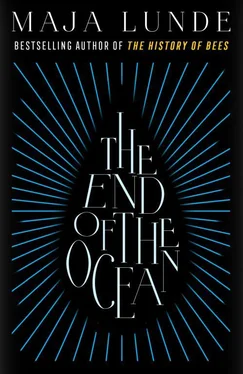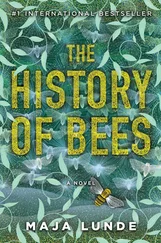But letting me win would perhaps have meant breaking the rules of the game between us. Because we were supposed to argue, in a strange way I think we almost wanted to, that siblings want to argue. It’s so easy, much easier than being good to one another.
She was always older than me. Much older. After I had children, the age difference was sort of obliterated for some reason or other. It was strange that she still lived the life of a young person, while I changed diapers and heated nursing bottles. But now, after the past few months, I started thinking of her as my big sister again. Not older, but big .
Alice, my big sister… I didn’t know where she was, either. That clever sister of mine, clever with words, clever with numbers, clever with her hands. She built things, all the time. No, not built, constructed, but she never had the chance to become an engineer as she had planned. The crisis over-whelmed her. She created so many things: a windmill in the garden, a solar-cell-powered dollhouse, won an inventor’s contest at school. Where was she now?
My family. Alice, Mom, my aunts. Grandmother and Grandfather. Eduard, the only one of my friends with whom I had cried. Where was he? Where were they?
And Dad… my elderly father. That feeble body of his, the unsteady gait, where was he? He was tougher than I’d thought; people like him usually didn’t survive the summers. Hundreds of thousands of elderly people had passed away in recent years because of the heat. The nights in particular took their toll, the extreme heat, the aging bodies never found rest. But Dad lived. The heat didn’t get to him, like it did with the rest of us, it didn’t have any effect on him.
I had been angry with him for so many years. Angry with him for having had children far too late in life. So late that he couldn’t bring himself to be a father. Couldn’t bring himself to do the things a daddy does, what the other daddies did. Toss me into the air over his head, wrestle with me, raise his voice when I did something I wasn’t supposed to do.
Alice had been enough for him, a careful girl, well behaved, seldom dirty. I was simply far too much. With Dad I felt like I was all elbows, clumsy. Hard and sinewy. Far too loud, my movements uncontrolled. He never said it, but I was still young when I started noticing how he would leave the room when I came in. His sighs. How he lifted his book—always some book or other—protectively up against his face, using the book as a shield.
He didn’t even manage to follow up on my schooling, didn’t understand my impatience, my confusion over the letters of the alphabet. He had never been like that himself. I used to think that he’d always been old. And I was madder than hell with him for precisely that.
But still. Now I couldn’t imagine the world without that failing old body of his, without his sighs and his thousand-yard stare. My diminished old father. I had given up on him too soon. I could have tried to approach him. I should have. While there was still time.
I should have understood that he survived for a reason, that I was fortunate.
But they just left, he and Mom. One day in October of last year they closed up the house, covered the furniture with sheets and locked the door. They wanted to take the train to Paris, she had a cousin there. Alice went with them, too. From there they hoped they would be able to continue further north. In May we received our last message from them. They hadn’t been granted residency anywhere, but were going to try to get to Denmark on their own. After that… nothing.
I walked quickly. We passed the halls. The sanitary barracks.
I pulled air into my lungs. Dad… stop thinking about him, you have to stop thinking about him. About Dad. About Mom. About Alice.
Because there were too many people. Too many of them. I didn’t have enough hope for so many people. Only for Anna and August. Their faces, the smell of August, his gurgling, the hollow of Anna’s neck, snuggling against it, in it. Just the two of them. That would have to do. If I could have them, it would do.
“Where are we going, Daddy?”
Lou trotted alongside me, struggling to keep up. “Daddy?”
“I don’t know. Out.”
I took a breath. Tried to smile at her. “We’ll just go for a little walk.”
She didn’t want to go, I could see it on her face. But she didn’t protest. She just took my hand and held it tightly. Wherever I went, she followed.
I stepped briskly, adult strides.
I had to get some air. Had to stop thinking. Stop yearning. Just wait.
Anna. August.
Wait.
“You’re walking so fast,” Lou said.
“Sorry,” I said.
And I pulled her towards the exit.
It’s easy to find out where he lives. Some things have actually become easier and he clearly hasn’t made any attempt to hide it, the address is posted on several sites on the internet.
I look through the maritime maps, I have what I need, having sailed these waters before, so I quickly undo the mooring lines, start the engine and leave Ringfjorden, gliding through silent, pitch-black water.
It’s as if I can feel the ice. The helm of Blue seems heavier under my hand, the distribution of weight is different and it infiltrates my body, as if the locus of my own center of gravity had also shifted. It feels like the boat is lying low in the water, but that can’t be right—a couple of hundred kilos is nothing compared to the boat’s 3.5 tons, it can’t be enough to produce this change.
Painful shocks tingle through my fingers, the warmth in them starting to return. I have put on gloves, thick knitted gloves, threadbare on the fingertips, it was Mom who knitted them, she struggled for months with these gloves; I can’t remember her ever knitting anything else, they are water- and wind-resistant, wool keeps you warm even when it’s wet.
I put my foot carefully on the throttle and press it slowly towards the floor, letting the engine run at the highest rotational speed I think it will withstand. I don’t raise the sail. I make do with the engine, the iron sail. The night is calm, the ocean lustrous, and nonetheless I must get away, quickly, before somebody discovers what I have done.
The mountains flatten out as I approach the ocean. I remember this fjord being long, the trip out taking an eternity. It was almost meaningless to try to make it all the way to open sea, too much for one day, I remember thinking, even though that was also all I wanted, to get out.
For some people the mountains are a security blanket. They wrap themselves up in them, pull them over their heads to hold them in place. Magnus was like that, they made him feel calm, he said. I never understood how he could think like that, because they loomed over me, I could feel their presence even when I was a child—the heaviness, the weight of them.
That feeling only released its grip at higher altitudes. Daddy used to take me up into the mountains, ever since I was small, just him and me, to the glacier, to the Sister Falls, and up there, when I was with him, I could breathe.
Had it been up to me we would have gone hiking every single day, Daddy and I. He stopped all the time to show me plants, insects or animals, point out small things on the ground, or birds, no more than specks way up in the sky, which I never would have noticed without his help.
We often followed the river up to the mountain.
He loved the River Breio, that was what had brought him here. He came to Ringfjorden as a young student. He was going to write a long dissertation about the freshwater pearl mussel, Margaritifera margaritifera , an unassuming small species that lived partially hidden between stones and gravel at the bottom of the river. He told me that the larvae pass through a parasitic juvenile phase, maturing in the gills and fins of salmon and trout, while the adult mussel filter-feeds on microorganisms, and in this way also cleans the river for the surrounding environment.
Читать дальше










